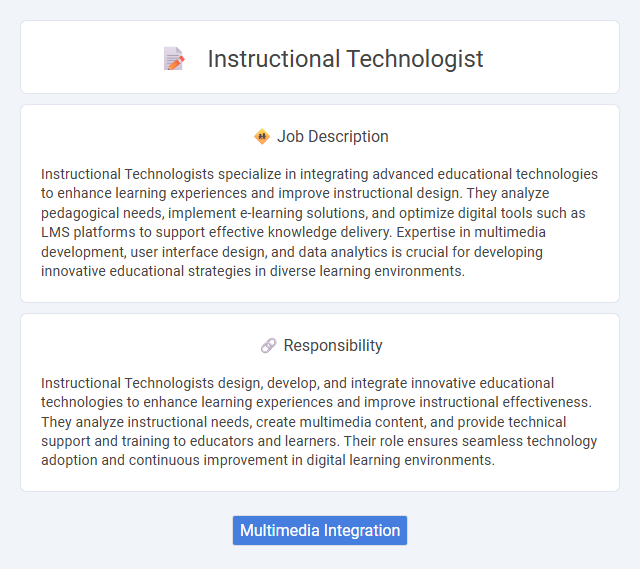
Instructional Technologists specialize in integrating advanced educational technologies to enhance learning experiences and improve instructional design. They analyze pedagogical needs, implement e-learning solutions, and optimize digital tools such as LMS platforms to support effective knowledge delivery. Expertise in multimedia development, user interface design, and data analytics is crucial for developing innovative educational strategies in diverse learning environments.
Individuals with strong communication skills and a passion for educational technology are likely suitable for an Instructional Technologist role, as it requires designing and implementing effective learning solutions. People comfortable with analyzing data, troubleshooting technical issues, and collaborating with educators might find this job fitting. Those who prefer routine tasks without the need for continuous learning may not find this position as suitable.
Qualification
Instructional Technologists require a strong foundation in educational technology, often holding a bachelor's or master's degree in instructional design, educational technology, or a related field. Proficiency in learning management systems (LMS), multimedia authoring tools, and e-learning software is essential for designing effective training materials. Strong analytical skills and experience with data-driven instructional strategies enhance their ability to improve learner outcomes.
Responsibility
Instructional Technologists design, develop, and integrate innovative educational technologies to enhance learning experiences and improve instructional effectiveness. They analyze instructional needs, create multimedia content, and provide technical support and training to educators and learners. Their role ensures seamless technology adoption and continuous improvement in digital learning environments.
Benefit
Instructional Technologists likely enhance educational experiences by integrating technology effectively, improving learning outcomes for students and educators. They may increase efficiency in content delivery, reducing time and resource consumption for institutions. Organizations probably experience higher engagement and retention rates due to the innovative solutions these professionals implement.
Challenge
The role of an Instructional Technologist likely presents challenges in integrating rapidly evolving educational technologies with diverse learning environments. Adapting instructional design to meet varied learner needs and institutional goals may require ongoing problem-solving and innovation. Navigating technical issues alongside pedagogical effectiveness could frequently demand a balance of creativity and technical expertise.
Career Advancement
Instructional Technologists advance their careers by developing expertise in e-learning software, curriculum design, and emerging educational technologies. Mastery of data analytics and user experience optimization enhances their ability to tailor instructional materials effectively. Pursuing certifications such as Certified Professional in Learning and Performance (CPLP) and gaining leadership experience can lead to roles like Instructional Design Manager or Learning Experience Director.
Key Terms
Multimedia Integration
Instructional Technologists specializing in multimedia integration design and implement interactive educational content using videos, animations, and audio elements to enhance learning experiences. They leverage tools like Adobe Creative Suite, Articulate Storyline, and Camtasia to develop engaging e-learning modules that accommodate diverse learning styles. Proficiency in Learning Management Systems (LMS) such as Moodle or Blackboard ensures seamless delivery and tracking of multimedia-rich instructional materials.
 kuljobs.com
kuljobs.com